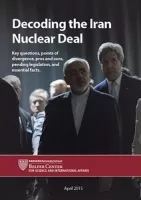On April 2, 2015, the EU (on behalf of the P5+1 countries) and Iran announced agreement on “key parameters” for a comprehensive nuclear deal with Iran. The EU-Iran Joint Statement is buttressed by unilateral fact sheets issued by the U.S. and Iran, which provide further details of the framework accord. Not surprisingly, differences have emerged between the U.S. and Iranian versions of the deal. These differences reflect both political spin and remaining issues that have not been resolved. In the next phase of this process, the negotiators will seek to finalize a comprehensive agreement by June 30, 2015.
To assist Members of Congress and others to evaluate the emerging deal, the Belfer Center for Science and International Affairs at the Harvard Kennedy School has prepared this Policy Brief summarizing key facts, core concepts, and major arguments for and against the emerging deal. Amidst the sound and fury of claim and counter-claim, the purpose of this Policy Brief is not to advocate support for or opposition to the deal, but rather to provide an objective, nonpartisan summary to inform Members of Congress and others in coming to their own conclusions. The team of experts who prepared this report includes Democrats, Republicans, independents, and internationals, who have many disagreements among themselves, but who agree that this Brief presents the essentials objectively. Since the negotiations are ongoing and the debate is intensifying, we invite readers who disagree with our presentation or who have additional questions or points to send their comments to us at iran_matters@hks.harvard.edu. If suitable, we will post these contributions with attribution on our website Iran Matters.

The full text of this publication is available in the link below.
